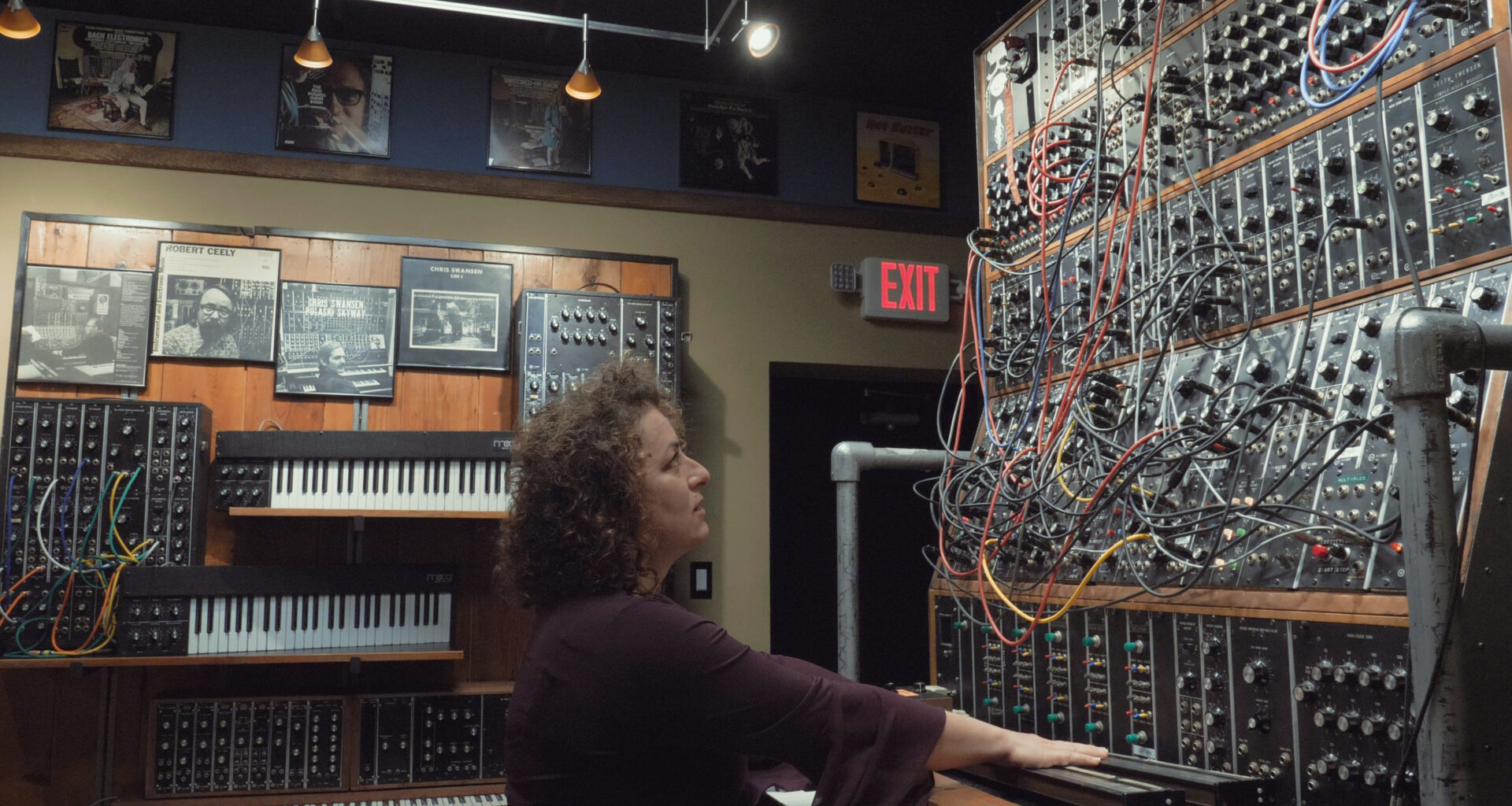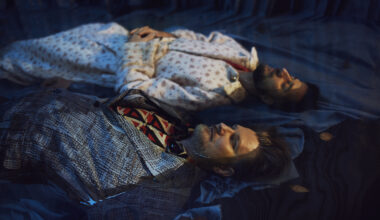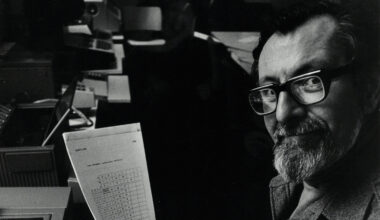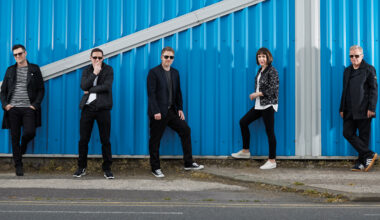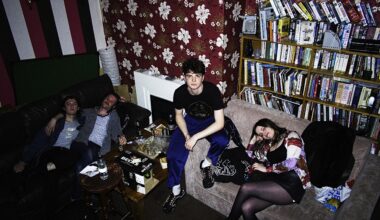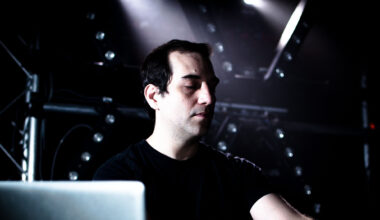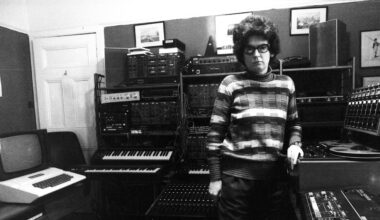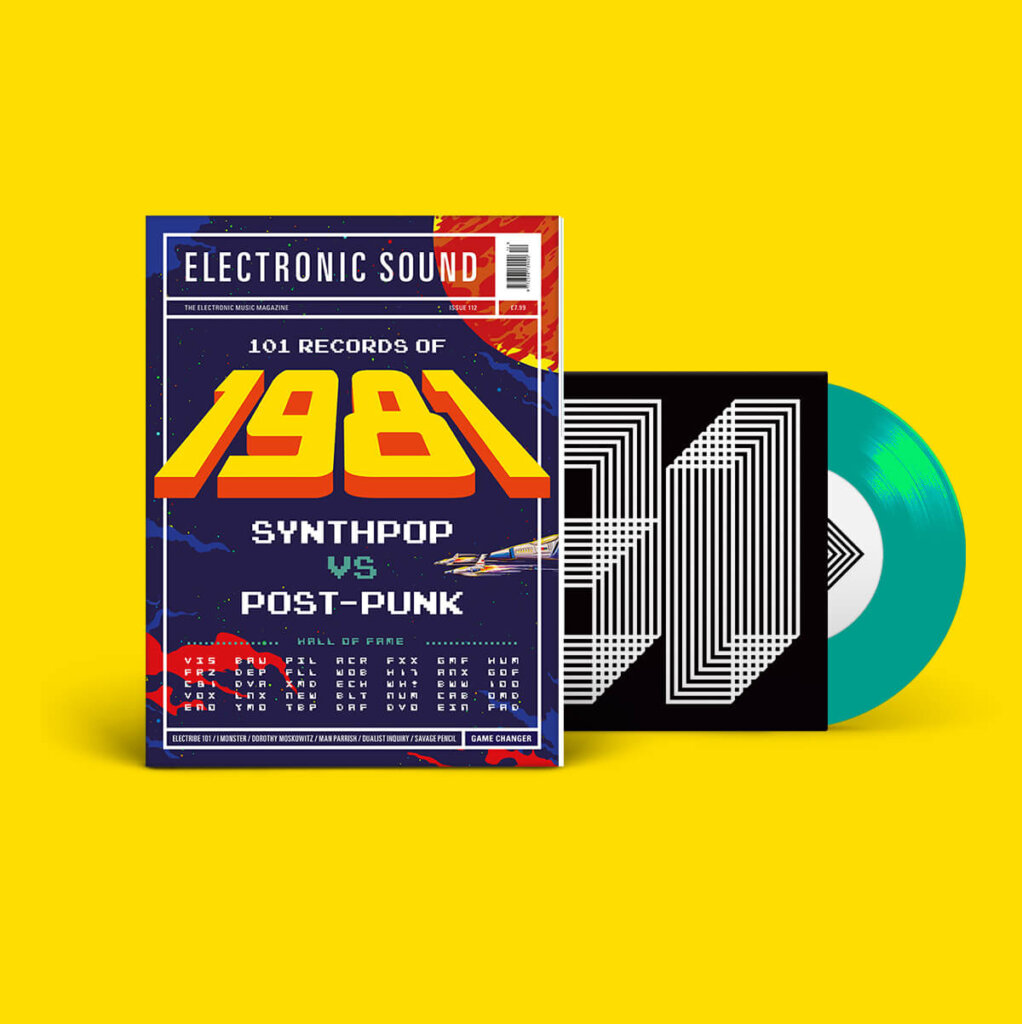Filmmaker Jason Amm and Michelle Koussa-Moog
talk about their new documentary on the life and work of her famous dad, Bob Moog.
Electronic music has been an all-consuming obsession for almost my entire life.
I came of age in the era of synth-heavy pop hits by Duran Duran, Prince, and the Thompson Twins, and before that I had electronic music ingrained in my psyche at pre-school, where Gershon Kingsley’s instrumental Moog record ‘Popcorn’ accompanied a daily physical fitness routine.
Once I heard the analogue sound of bands like Depeche Mode, Fad Gadget, Soft Cell, and Skinny Puppy, there was no turning back. Another epiphany arrived in the 1990s, when I discovered the artists like Aphex Twin and Autechre. I soon started buying synthesisers and producing my own electronic music under the name Solvent, founding my own record label Suction Records, both still active.
Several years ago I met Robert Fantinatto, who was working on a documentary about modular synthesisers, and he asked if I would be willing to produce the film soundtrack.
I agreed, and within a matter of weeks I had become so enthusiastic about the project that we decided to make it into a collaboration.
That film came to fruition as the well-known documentary ‘I Dream Of Wires’. Not only did we manage to interview some serious electronic music royalty (Trent Reznor, Vince Clarke, Gary Numan, Daniel Miller, Carl Craig, John Foxx, Chris Carter, the list goes on), it even ended up on Netflix. We immediately turned our focus to a follow-up film, a new documentary about Bob Moog, one of the most important and legendary stories in electronic music history. Of course, there have been Moog documentaries before, ours was different is that it would cover Bob Moog’s entire journey. The name ‘Electronic Voyager’ came up early on, and we’ve stuck with it.
We asked Michelle Moog-Koussa if she would like to come on board as the host. Michelle is not only Bob Moog’s daughter, she’s the executive director of the Bob Moog Foundation, so her knowledge and passion for all things Moog, both personally and professionally, runs deep. We were thrilled when she agreed, and ‘Electronic Voyager’ has morphed into something really special, a daughter’s journey to retrace her father’s footsteps, reconciling the man she knew with the world-famous electronic music icon.
It’s been a journey for me too, sitting in on Michelle’s fascinating conversations with Moog musicians and luminaries like Jean-Michel Jarre, Rick Wakeman, Gary Numan, Bernie Worrell, Dick Hyman, Gershon Kingsley, and David Van Koevering. More than three years after we started, the film is now deep in post-production and we’re on the verge of launching a new Indiegogo campaign to raise the final funding. Taking some time out during a recent film shoot, I sat down with Michelle to discuss her father, her work at the Bob Moog Foundation and her personal journey in ‘Electronic Voyager’.”
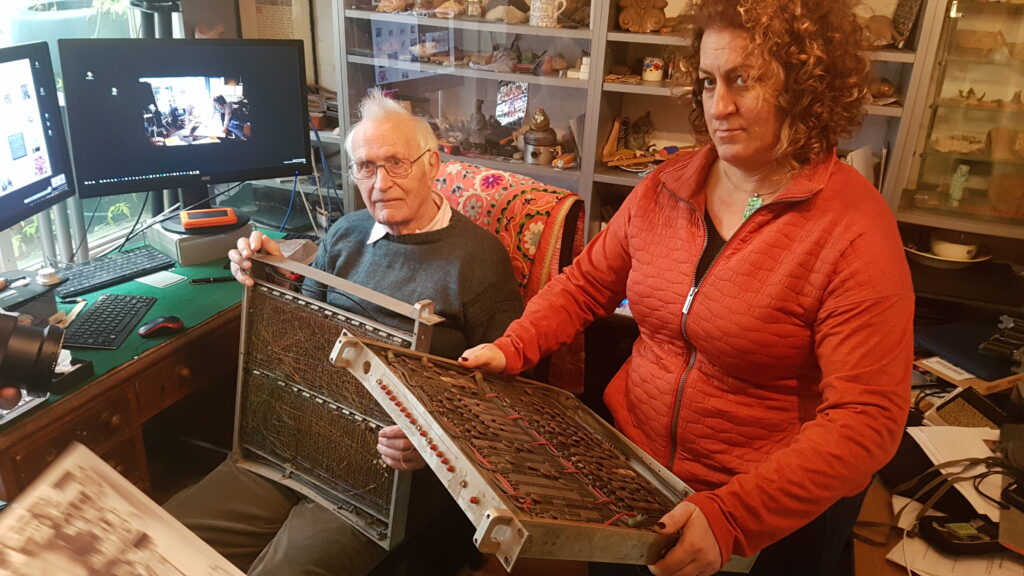
What was your understanding of your dad’s career when you were young?
“When I was 12, it was 1980. We’d recently moved from Buffalo, NY, to rural western North Carolina. Dad had left Moog Music, and started his own company, Big Briar. My understanding of my father’s work at this time was still a bit limited because he almost always held his career at arm’s length from us, and never talked about it much.
“He was also quite serious by nature, which I found a bit intimidating, so I never felt that it was appropriate to start peppering him with a bunch of naive questions. We almost never had synthesisers in the house, we never talked about synthesisers at the dinner table, and when I did tiptoe out to Dad’s workshop, it was to give him a kiss goodnight. I was never encouraged to stick around. He was very sweet, and would take my face in his hands and give me a kiss goodnight, but it was clear that he was busy, and I would pad back to the house pondering what all the weird contraptions on his workbench were, and what huge body of knowledge he must have to understand what appeared to me as a very mysterious universe of weird sounds and bright squiggly waveforms.
“Dad almost never talked to me about music, outside of my violin playing. He left all of us to our own musical devices, and we had wide-ranging tastes, but I never remember any synthesiser-driven music being part of my childhood experience. When we went to concerts as a family, it was usually local or classical music – almost always acoustic. That said, I did understand the basics of Dad’s career: he had invented the Moog synthesiser, which had helped revolutionise the face of music, he was famous, he was respected, and he had a lot of really smart, creative friends.
“Some of those things I only understood after seeing him on [celebrity-panel TV show] ‘To Tell The Truth’ when I was about five years old, or when reporters from the local papers came around to do a story about him. It was really up to me to figure out what it all meant because neither of my parents really talked about it. If they talked about anything work-related, it was about the personalities at work, and not the work itself. So at that point, I would say that Dad’s career and the existence of ‘Bob Moog’ was somewhat akin to Pluto. You know it exists, but it’s so far removed from your daily life that you don’t think about it very much and you focus on what you intellectually process.”
Do you recall your first glimpses of Bob Moog’s fame?
“Things shifted a little bit by the time I was 18. By that time, Dad showed up in my Physical Science textbook in my freshman year of high school. I had sat in the back of our tiny Volkswagen Rabbit as he drove me home from school while he was being interviewed by Eleanor Clift of Newsweek and I had discovered only through my friends at school that he had received a star on the Rock Walk Hall of Fame. In those teenage years, my friends made a bigger deal out of my father’s fame, so his career was a bit more in the forefront, but never a focus. At that age, I understood what he had accomplished, but I still had no idea of the real impact of his work.
“It was strange to try to reconcile the famous inventor with my quiet, serious, humble, geeky dad. It was almost like a Clark Kent/Superman type dynamic – two completely different guys, unrecognisable in the other’s world. Perhaps the most surreal experience of all is when I attended NAMM with my father in January 1990. I was a senior in college, and Dad invited me to come with him since he knew that I wanted to visit my grandparents who lived nearby. He received so much attention and adulation at NAMM that it kind of blew my mind. But it was when a rabid fan got down on his knees and proclaimed his devotion to my father that I really had an out of body experience. At that point, when I was 21, I really had no idea why someone idolise him.”
Career aside, what kind of father was Bob Moog to you?
“Dad was quiet, serious, and focused by nature, and he was often consumed by his work, which often had him travelling, so in those ways, he was a bit distant as a parent when I was growing up. But the interesting thing about Dad was that when he was with you, he was 100 per cent present. He was open, perceptive, thoughtful, and he had a great sense of humour.
“He had a very rare, wise presence about him, and I always enjoyed hearing his commentary about whatever was being discussed. He was particularly engaged when it came to my violin lessons, and my education. I always knew that if I needed help with homework, Dad would be available, and he was a great teacher. I think that one of his biggest credits as a parent was that wanted his kids to be their own people. He encouraged and supported our interests, no matter how far they were from his own. He was a humanist, and an individualist and he encouraged that in his children.”
Bob Moog is a name so synonymous with electronic music history, what are some of his personality traits that you think would surprise a lot of people?
“Well, I would argue that most people only know the myth, and know very little about Bob as a person. Among things that might surprise people is that he was an avid gardener, hiker, birdwatcher, mushroom collector, nature lover, and found great solace in the Earth. He liked music, but he rarely listened to it at home, instead saving the experience for live performance, which he really enjoyed.
“When he wasn’t working in the sonic world, he greatly preferred silence. He rarely mentioned his accomplishments, nor did he have an elitist attitude. He was open and accepting of people from all walks of life. When asked once what it was like to know so many celebrities, he answered, ‘I don’t embrace the notion of celebrity’. This is one of the reasons that he was uncomfortable with his own fame, and one of the reasons he shielded his family from it.”
I understand you had an epiphany about your dad after his death in 2005?
“I like to say that I knew my Dad, but I didn’t know Bob Moog until he died. As I mentioned, my father held his career at arm’s length from the family. As a result, we all understood the nature of his work and accomplishments, but I don’t think we truly understood the depth of the impact until he got sick near the end of his life.
“Around that time, we received thousands of testimonials from people all over the world, from people relating how Bob Moog had changed, and in some cases, transformed, their lives through his instruments and the music they inspired. I would read these testimonials at night, after I had put my children to bed. When I did, all of the walls that my father had built up to keep ‘Bob Moog’ from the family came tumbling down. It is through these people that I began to understand what Bob Moog meant to the world.”
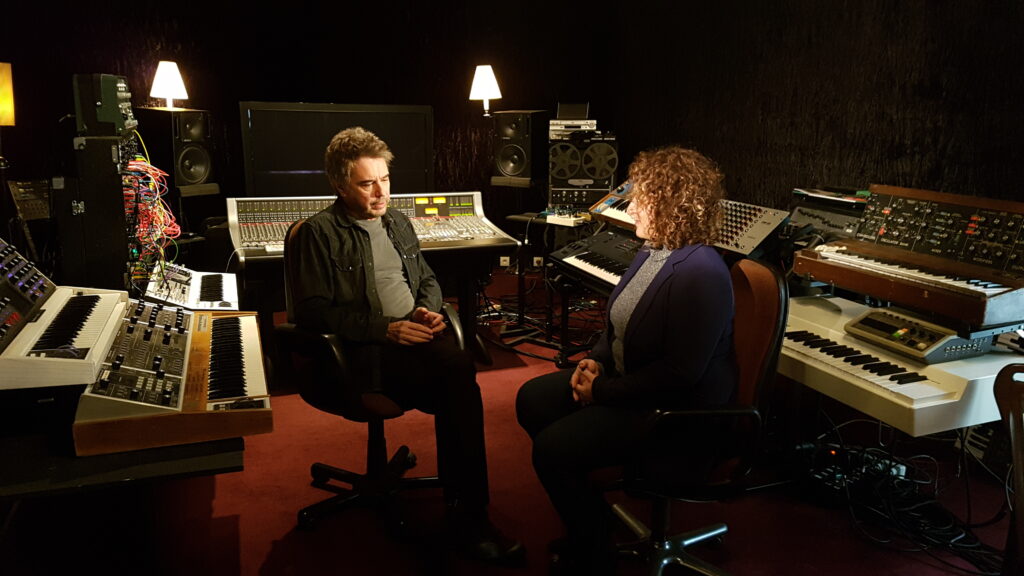
What motivated your decision to start The Bob Moog Foundation?
“My family decided to create the Bob Moog Foundation after receiving the countless stories of how he had inspired people’s lives. We felt the depth and breadth of that inspiration deserved to be carried forward to future generations. It didn’t even seem like a choice. Inspiration can be a very powerful force, and we were committed to using it to continue to inspire people.”
Do think he’d be surprised to know you have made his legacy your life’s work?
“I don’t think my father would have imagined a foundation in his name, and I don’t think it would have been his idea, but I know that he would love the work that we are doing in education and in historic preservation, two things that he was greatly committed to himself. I think he might be a little surprised to witness that way I have embraced the Foundation’s work, but I think he would recognise that kind of passion and commitment, as he exhibited it himself throughout his career.”
What is the Bob Moog Foundation’s mission?
“The mission of The Bob Moog Foundation is to foster creativity and critical thinking by providing interactive educational experiences drawn from Bob Moog’s pioneering legacy of synthesising science, music, and innovation. We provide hands-on immersive opportunities for children and adults to explore and engage with the science of sound through Dr Bob’s SoundSchool and the Moogseum.
“Through these projects, we inspire the next generation of innovative thinkers. Our hallmark educational project, Dr Bob’s SoundSchool, teaches second grade students [seven and eight year olds] about the science of sound through music and technology. Through this 10-week experiential curriculum we have inspired over 13,000 children in the past seven years.
“We also protect, preserve, and share a vast archive of historic materials that includes instruments, prototypes, photographs, schematics, correspondence, notebooks, vintage catalogues, and more through The Bob Moog Foundation Archives. We serve as a repository for people who want to donate their vintage materials to an organisation they know will use and care for them. Our educational and historic preservation projects will converge to create a Moogseum, opening in late spring 2019.”
When we approached you about ‘Electronic Voyager’, did you feel it was time, more than a decade after the release of Hans Fjellestad’s ‘Moog’ bio-doc, to revisit the story?
“I’ve always had an interest in portraying my father in his entirety, and not just as an admired icon. Hans Fjellestad’s documentary does that to some extent, but through a lens that was limited in scope, which was actually Hans’ intention. It has remained important to capture a more complete version of my father’s life story and provide a strong narrative of his experiences so that people have adequate understanding and context.”
How did you feel when we pitched the idea of documenting Bob Moog’s story through your eyes?
“I like to say that humility is the Moog family religion, with Dad leading the way by example. That being the case, I had some concerns about being at the forefront of the documentary, but I realised that there was nobody who had the same mix of personal and professional insights and understanding that I did. After I overcame that initial concern, I found the idea tremendously exciting because I knew I would learn a great deal through the experience, and meet all kinds of people who I didn’t know, or only knew peripherally. I find anything that draws me closer to my father, his work, and his legacy tremendously exciting.”
The interviews in ‘Electronic Voyager’ are very personal. Why do you think people respond so emotionally to you when speaking about Bob?
“I think being his daughter is part of it, as people tend to feel a closeness to him through my familial connection. But I think people sense immediately that I’m genuine and sincere, I’m searching for answers, and I’m open to honest answers. They respond to that openness by being open themselves.”
What have been some of your personal and highlights while filming?
“It would be really hard to single out highlights, as nearly every interview has provided some deeper insight, some deeper connection. From sitting around the dinner table with former engineers and colleagues from RA Moog Co, to visiting my earliest childhood home, to speaking with my family members, to discussing the legacy with Dad’s close industry friends, rock stars, and luminaries – the entire experience has been a journey of revelation and connection.”
Finally, you’ve made your dad’s legacy your life’s work, how do you separate Bob Moog the icon, from your father?
“They are really two different people to me, to the extent that I try to refer to Bob when I’m at work, which I know some people find bewildering. I feel that it’s important for people to understand that the Foundation isn’t about ‘my dad’, but about the inspirational force that Bob Moog unwittingly cultivated through his life’s work, and more importantly about carrying that inspiration forward to future generations.
“I have a personal and private relationship with my father which is entirely different from the very public relationship that he had with the rest of the world. Keeping them separate, referring to them separately, is one way to maintain that relationship – to keep a little bit
of him just for me, and my family.”
For more information, visit moogfoundation.org.
